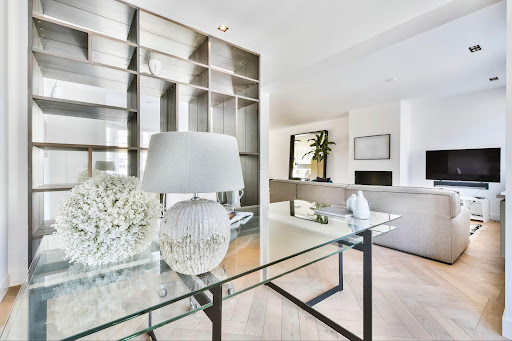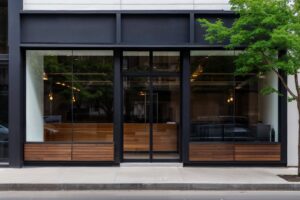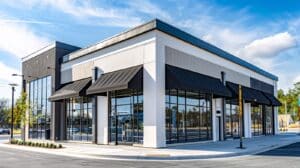Glass tabletops are a staple of modern interior design, offering a blend of elegance, function, and aesthetic versatility. However, not all glass is created equal. The types of glass you may consider for a tabletop can vary dramatically in terms of their properties and suitability for specific situations.
In this guide, we take a closer look at the types of glass used for tabletops and explore some little-known facts that could influence your decision-making process.
Types of Glass for Tabletops
1. Tempered Glass
Composition and Manufacturing: Tempered glass is made from annealed glass that has been subjected to thermal tempering, involving heating the glass to over 1,100°F and then cooling it rapidly.
Strength and Durability: This treatment increases its tensile strength, making tempered glass four to five times stronger than annealed glass.
Safety: One of its standout features is its safety; if broken, it disintegrates into small, granular pieces instead of sharp shards, reducing injury risk.
Applications: Due to its strength and safety features, tempered glass is used in various settings, including patio tables, dining tables, and commercial spaces like conference rooms.
Cost: While tempered glass is more expensive than annealed glass, its durability often justifies the cost in high-traffic or high-risk areas.
2. Annealed Glass
Composition and Manufacturing: Annealed glass is what you might consider “standard” glass. It is cooled slowly during the manufacturing process to relieve internal stresses.
Strength and Durability: It’s weaker than tempered glass and can break into large, jagged pieces, posing a safety risk.
Applications: Generally used in settings where safety and strength are less of a concern, such as small indoor tables or decorative pieces.
Cost: This type is often less expensive but isn’t recommended for heavy-duty applications due to its weaker structure.
3. Laminated Glass
Composition and Manufacturing: Laminated glass is essentially a glass sandwich; it features two or more layers of glass with a layer of resin or polyvinyl butyral (PVB) in between.
Strength and Durability: It is strong but not as strong as tempered glass. However, its layered structure provides excellent durability.
Safety: If broken, the plastic layer holds the glass in place, making it an ideal choice for outdoor settings or homes with children.
Applications: Frequently used in skylights, balconies, and even car windshields, laminated glass is an excellent option for tables that need to be durable and safe.
Cost: The additional manufacturing process makes laminated glass a more expensive option.
4. Frosted Glass
Composition and Manufacturing: Frosted glass is created by sandblasting or acid etching one side of clear glass.
Aesthetic and Function: It provides a translucent surface, diffusing light and offering privacy while still allowing light to pass through.
Applications: Often used in office settings for a sleek, modern look without sacrificing privacy.
Cost: Generally more expensive than basic annealed glass due to the additional etching or sandblasting process.
5. Textured Glass
Composition and Manufacturing: This type of glass is imprinted with textures during the molten stage of production, creating patterns like ripples, waves, or geometric shapes.
Aesthetic and Function: Mostly used for its decorative properties, textured glass adds a unique touch to furniture.
Applications: Ideal for coffee tables, accent tables, or as a creative design element in custom furniture.
Cost: The specialized manufacturing process can make textured glass more expensive than standard options.
6. Low-E Glass
Composition and Manufacturing: Low-E glass is coated with a microscopic layer of metallic oxides.
Function: This coating reflects thermal radiation, making it energy-efficient by reducing UV and infrared light penetration.
Applications: Perfect for outdoor tables where sunlight exposure is a concern.
Cost: Due to the special coating, Low-E glass is often more expensive than other types.
Now that you have a little more insight into the types of glass available for tabletops, let’s look at some other glass tabletop FAQs, but not just any facts; let’s look at the less commonly known ones.

Little-Known Facts About Glass Tabletops
Historical Innovation
Glassmaking dates back to ancient Mesopotamia, but it wasn’t until the Roman Empire that the technology evolved to produce clear glass, leading to its usage in furniture like tabletops.
Edge Customization
Beyond basic edge types like flat, pencil, and beveled, there are more intricate designs like the ogee and waterfall edges, which add elegance to your table.
Thermal Resistance
Tempered glass not only resists physical impact but also offers greater thermal resistance compared to standard glass, making it suitable for tables near heat sources.
Color Spectrum
In addition to traditional clear glass, you can opt for tinted glass in hues ranging from bronze to gray to blue, which offer varying levels of UV protection.
The Weight Factor
Glass is heavy. A 3/4-inch thick, 48-inch round glass tabletop can weigh as much as 130 pounds, which is why proper table base support is crucial.
Not Just Recyclable, but Upcyclable
Glass can be melted down and reformed without losing quality, meaning your old glass tabletop could be transformed into other glass products in its next life.
Acoustic Influences
While not immediately obvious, the density and thickness of your glass tabletop can subtly impact the acoustics of a room. Denser, thicker glass absorbs more sound energy, reducing noise levels.
New Glass Tabletops Installation
Understanding the details about different types of glass and their peculiar facts will help you make an informed choice, adding beauty and functionality to your space. If you are ready to make your decision, the next step is to hire a professional to ensure your new glass tabletops are properly installed.
And here’s why …
1. Safety Concerns
First and foremost, safety should be your top priority when dealing with glass. Even-tempered or laminated glass, designed to be more durable and safer upon breakage, can pose risks if mishandled. Professionals are trained in proper handling techniques and have the right safety gear, such as gloves, eye protection, and specialized footwear, to minimize the risks of cuts, punctures, or more serious injuries.
2. Specialized Tools and Equipment
Installing a glass tabletop often requires specialized tools that most homeowners do not have. This could range from suction lifters for safely moving and positioning the glass to precision laser levels for ensuring perfect alignment. Professionals have access to these tools and are trained in using them efficiently, making the installation process smoother and more reliable.
3. Customization and Fit
Not all tabletops are created equal. Many modern designs feature custom shapes, beveled edges, or even engraved details. A professional will take accurate measurements and possibly even create templates to ensure that the glass fits perfectly on its base, accounting for any unique characteristics in the design. DIY attempts at this level of customization are fraught with the risk of miscalculations, leading to poor fit and wasted materials.
4. Structural Integrity
A professional installer understands the nuances of weight distribution and structural integrity, which is crucial when dealing with a heavy material like glass. They can assess the strength of the table base and recommend any necessary reinforcements to prevent the table from becoming unstable or collapsing, thereby averting potential disasters.
5. Material Knowledge
Different types of glass have different properties, from weight and strength to thermal and UV resistance. Professionals are knowledgeable about these aspects and can provide valuable guidance on the type of glass best suited for your particular application, be it an outdoor dining table or an elegant coffee table for the living room.
6. Aesthetic Expertise
Professionals bring an aesthetic touch to the installation process. Whether aligning the tabletop to optimize visual symmetry or ensuring that any textural elements are showcased to their best effect, a skilled installer adds finesse that a DIY enthusiast may find challenging to replicate.
7. Time-Efficiency
Time is often underestimated in DIY projects. What may appear to be a straightforward job could consume hours or even days, disrupting your schedule. Professionals, with their expertise and specialized tools, can perform the installation far more quickly, freeing up your time for other important tasks.
8. Warranty and Liability
When you employ a professional service, you’re often covered by warranties or guarantees on the materials used and the labor involved. This provides a safety net in case anything goes wrong with the installation. DIY installations usually lack this level of financial and material protection, leaving you liable for any mistakes or damages.
9. Troubleshooting and Problem-Solving
Even a seemingly simple installation can present unexpected challenges, such as an uneven floor or pre-existing damage to the table base. Professionals have the experience to troubleshoot these issues on the spot, applying solutions that maintain both the function and form of the tabletop.
10. Post-Installation Services
Beyond just the installation, professionals often offer added services like sealing the edges for additional safety, cleaning the glass to a spotless finish, or providing care instructions tailored to your specific type of glass. These final touches can make a significant difference in the longevity and appearance of your tabletop.
11. Compliance with Local Codes and Regulations
Some regions have building codes or homeowner association rules that dictate how and what materials can be installed. Professionals are usually well-versed in these regulations and can ensure your installation complies with all local statutes, avoiding potential legal complications.
While installing a glass tabletop might seem like a straightforward task, the intricate details and risks involved make it a job best left to professionals. From ensuring safety and structural integrity to delivering a polished, aesthetically pleasing result, professional installation is the most prudent choice for your glass tabletop needs.
Get Your Custom Glass Table Top From Murray Glass
Ready to transform your living space with a custom glass tabletop that marries elegance with utility? Murray Glass is your dependable authority in all things glass. Offering unparalleled workmanship, meticulous detail, and a vast array of personalization possibilities, we’re your first call for quality glass tabletops. Why go for run-of-the-mill when you can opt for the exceptional?
Contact the skilled team at Murray Glass at 801.262.3364. Allow us to actualize your creative vision, redefine your space, and provide you with a uniquely crafted glass tabletop that sets us apart.





